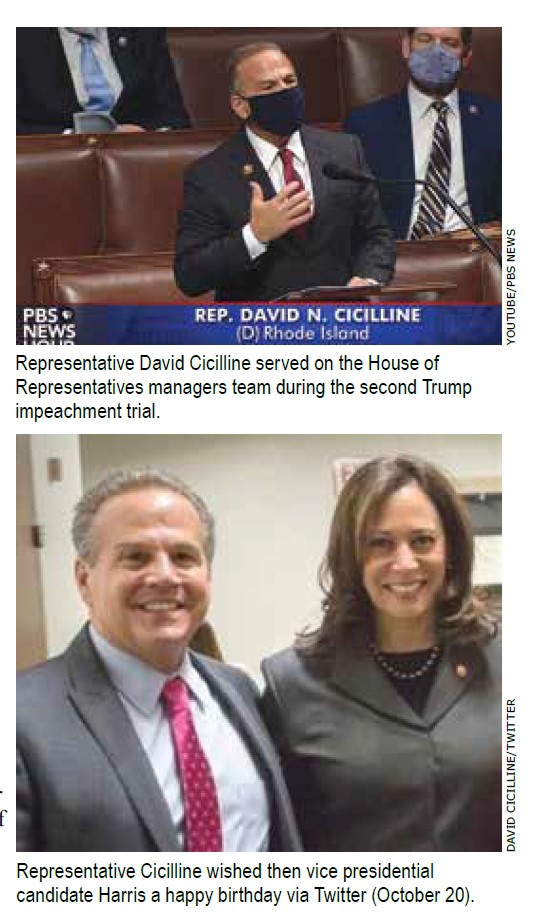
By Andrea Shorter–
Now that NASA has successfully landed the Perseverance rover on Mars in further search of other intelligent or not so intelligent life forms, perhaps we can now get down to the earthly business of finally passing the Equality Act.
With a Democratic party majority in both the 117th Congress and the Senate, passing the latest Equality Act should not be an out of this world proposition. However, even with the constellation of landmark legislative stars lining up in favor of its passage past committee, perseverance is still needed to land a nearly 50 years in the making Equality Act on a supportive ally president’s desk for signature and to make it the law of the land.
The very recent popular notion that the introduction of the Equality Act to provide federal non-discriminatory protections for LGBT people came about upon the heels of the 2000s’ same-sex civil marriage equality battles is not the case. The voyage actually started long ago.
The Equality Act originated 47 years ago in 1974 with then and now late New York Representatives Bella Abzug and Ed Koch, and basically sought to amend the then decade-old Civil Rights Act of 1964 to include prohibition of discrimination on the basis of sex, sexual orientation, and marital status in federally assisted programs, housing sales, rentals, financing, and brokerage services.
The bill died in the House Committee in the Judiciary. Its next iteration came in 1994 as the Employment Non-Discrimination Act or ENDA, but rightfully suffered tremendous pushback from the community as it did not include protections for our transgender brothers and sisters, apparently for expected and misguided political expediency towards passage. Even with its revised version to include both sexual orientation and gender identity, ENDA met its fateful end in the Senate, never making it to the House.
Fifteen years later in a renewed all of us or none, no one left behind inclusive LGBT liberation period, openly gay Representative David Cicilline of Rhode Island—yes, “that David Cicilline,” one of the recent House impeachment managers who robustly prosecuted the case for former President Trump’s conviction for inciting the violent insurrection to overturn his desperately lost election on January 6, 2021—introduced the Equality Act of 2015 in the 114th Congress, along with Democratic Senator Jeff Merkley.
The 2015 bills and their subsequent versions through the 114th, 115th, and the 116th Congress have died in committees of both houses, with the exception of having passed the House in the 116th session only to have been stalled in a Republican majority, Trump-McConnell strangle-held Senate.
Along the way, in 2015, I had the honor, privilege, and delight of meeting and working with Rep. Cicilline to organize an Equality Act educational panel at the San Francisco Main Public Library, along with respective legendary lesbian and transgender icons Roberta Achtenberg and Theresa Sparks. At that time, the need was still great to educate our own LGBTQ communities about the Equality Act, with a few misinformed by the idea that marriage equality would cement or blanket us with all federal protections.

Since then, the Equality Act has gained broad support from Congressional members, 63% of voters, the U.S. Chamber of Commerce and business and corporate sectors, and from dozens of social justice organization including the ACLU, NOW, NAACP, and the AARP.
Of course, there remains opposition to its passage, mainly and predictably from religious leaders claiming the Equality Act would infringe on religious liberties to basically discriminate against LGBT people without deference or interference from the government. Religious objection to homosexuality or non-heteronormative realities in the spectrum of the human condition since the dawn of time will not likely be fully resolved into the 21st century. After all, we are still clearly reckoning and dealing with suspect religious-based objections to racial and gender equality that still exist in a democratic society that proclaims equality of all men and women.
I would love to be able to impart some inspiring, deeply moving words about what the passage of the Equality Act means to me as a Black Lesbian in America. As someone whose very existence, identities, and expression of self are not fully granted equal recognition, status, and protection from discrimination under the law. I can marry on Sunday and get fired or not hired on Monday because of whom and how I love. Because of fear of the color of my skin, my right to vote is constantly under attack. My own body is not mine according to those seeking to control my reproductive choices. These are but a few of the realities of being my natural beautiful self from which I and other sisters like me draw strength and perseverance daily.
Honestly, I’ll always be prepared to fight for LGBTQ, gender, and racial equal rights. Frankly, I’m just tired of being sick and tired about not having our right to exist freely as queer people not protected against discrimination. I can only imagine what we could accomplish as a nation and as a species without being further encumbered by the costly fears and tired prejudices we spend so much energy either propagating or resisting.
It is time for the Equality Act to pass, to be signed by President Biden, and to become the law of land. With this constellation of Congress, Senate, and presidential stars in alignment, if not now, when? Well, it is a long wait until we land on Pluto.
Andrea Shorter is a Commissioner and the former President of the historic San Francisco Commission on the Status of Women. She is a longtime advocate for criminal and juvenile justice reform, voter rights and marriage equality. A Co-Founder of the Bayard Rustin LGBT Coalition, she was a 2009 David Bohnett LGBT Leadership Fellow at the Harvard Kennedy School of Government.
Published on February 25, 2021
Recent Comments